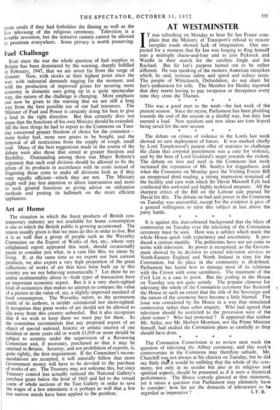Fuel Challenge
Ever since the war the whole question of fuel supplies in Britain has been dominated by the -warning, sharply fulfilled in February, 1947, that we are never far from the verge of disaster. Now, with stocks at their highest point since the war, with industrial demands sagging for the moment, and with the production of improved grates for securing more economy in domestic uses going up in a quite spectacular way, the nature of the challenge is changing. More emphasis can now be given to the warning that we are still a long way from the best possible use of our fuel resources. The Minister of Fuel and Power is certainly doing his best to give a lead in the right direction. But that certainly does not mean that the functions of his own Ministry should be extended. All the best things he had to report to the Commons on Tues- day concerned greater freedom. of choice for the consumer— more boiler fuel, more new grates to be bought, and the removal of all restrictions from the supply of rough, small coal. Many of the best suggestions made in the course of the debate were also those that aimed at greater freedom and flexibility. Outstanding among these was Major Roberts's argument that each coal division should be allowed to fix the prices of its products in accordance with its costs instead of disguising those costs to make all divisions look as if they were equally efficient—which they are not. The Ministry might well pay less attention to direct intervention and more to such general functions as giving advice on utilisation methods and putting its hallmark on the more efficient appliances.


































 Previous page
Previous page